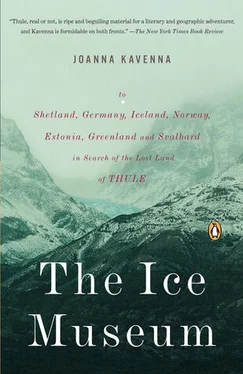Then they both said some bizarre things. The Philippine sailor said, ‘But perhaps we could go there anyway.’
And the captain said, ‘They’re not letting anyone into the air base. It didn’t used to be this way. We used to stop off there. Not this year.’
I was wide awake by this time but stayed still, wondering if they had seen me, or if they cared. They were walking off along the ship, sliding around on the deck, as the waves pushed the ship from side to side, a hypnotic lurch, a lurch my body was beginning to grow used to, which no longer made me sick.
I turned onto my back, watching the stars. The sky was dark blue. I heard the captain saying, ‘I still think we should turn back,’ as he vanished into the bridge.
At Melville Bay the sea was almost flat. The waves were like eels trapped under foil and the water was silver in the pale light. There was a band of blackness on the horizon. The north was under rain, and snowflakes fell onto the ship, lightly at first, becoming thicker. It was mid-afternoon, and the bar was full of people staring at the silent ice, as the sea congealed. The captain had come down from the bridge, and was standing with his hands on his hips, surveying the scene.
‘We are not going to Thule Air Base,’ said the captain. ‘It is not allowed.’
There was a collective sigh. No one really knew where we were any more; the map seemed to bear no relation to the ice cap, glinting in the distance, and the ragged rock piles along the coast. We all kept trying to pin a flag to a part of the map, trying to fix ourselves somewhere on the globe, but the vastness of the island, the silent blocks of empty stone, gave us little to go by. The ship was retreating further north, further into the whiteness. We’d had a change of course, and now we were heading straight towards new Thule. The second Thule, the Thule built for the Inuit when they were moved further north.
When the US Military arrived in Greenland in the early 1950s, events moved swiftly. The Inuit were soon led to understand that they couldn’t stay in Thule, the Thule Rasmussen had established, at the foot of the mountain where their ancestors were buried. They were informed that there was a new town waiting for them, a town of purpose-built Scandinavian houses. By these subtle negotiations, a change of location was made persuasive to the Inuit, and they went further north. They had arrived at a still colder place, which they called Qaanaaq in Inuit, or Thule. It was one of the most northerly settlements in the world.
The ship lumbered across the ocean, as the bergs bounced on the waves. There was a strange atmosphere to the evening. The skies darkened and a band of mist stretched across the mountains. There was a dull rumble from the glaciers, rolling across the sea towards the ship. Ellesmere Island stretched away in the distance, a range of white mountains. The ship moved the last miles along the ancient coast bordered by thick white waves, in and out of fjords, with the swell of the sea bullying the boat around, shoving it from left to right. The captain spent every hour on the bridge, dodging the ship around the bergs, which were growing by the day, clustering on the surface of the sea. The waves were harsh on the boat, they slapped the sides, as if they were trying to wake us from this trance-like progress along the coast. I stood on the bridge, with the captain surly in his uniform, staring at the sunset. The night swept across the skies, staining everything dark blue.
I was dimly aware of a worrying noise; it was ice shaving along the sides of the ship, scraping under the hull. The bergs drifted past, rocking on the darkness of the waves. When the ship approached the sea ice, the sound was the first thing I noticed: the distant crash of waves against ice, like breakers on a shore. There was a glow on the horizon, as if the remote slopes of a glacier would soon be visible, bleeding down the sides of a mountain. The ship moved through the ice, as the frozen chunks collided with each other, grinding under the hull of the ship. When the ship hit a low berg, the decks rose and fell, and a gentle shuddering went through the frame.
The ship sailed through the pack-ice, through a frozen sea. The forms of the ice were infinitely diverse, tinted by the sunlight, creating shades of green and blue, like distant flashing lights. All around lay a glittering expanse, spreading as far as I could see, casting a light into the mist, which hovered above the drifting ice. As the night drew on, the sky became cloudy and hostile, and the ice shapes bucked on the shifting ocean.
The morning was pale, as if the day were on edge. When the sun rose there was a creamy fog sitting on the sea, falling along the deck. But then the sun shone slightly through it, and the fog started to sift itself, rising off the ship.
We were at 77° N and 69° W. The last coils of mist hung on the waves, seeping along the shore. This was new Thule, a settlement arranged in tidy rows, with the more recent housing jumbled at the outskirts, falling out of the plan. The mountains lay under a sky of pink and orange. The harbour was one more pile of rubbish, one of the most northerly piles of rubbish in the world: rows of containers, plastic bags lying neglected on the muddy beach, the remnants of fishing boats, with the dogs forming piles of matted white fur. It was a Thule with a touch of the shakes to it; the drunks were shouting from their windows, stumbling along the roads, swinging umbrellas, rummaging through the supplies stacked by the harbour for bottles of beer.
It was the last stop for the ship and the biologists, the beer-struck Austrian, and the German scientists all stumbled onto the shore.
The Austrian was saying, ‘Is this Thule?’ He tripped on the rocks and almost fell, grabbing at a pile of boxes.
It was a Thule of sorts. This village was one of the most remote places you could find in the north. It was the edge of the world, this land of Greenland; there was little beyond it, only the dark realms around the North Pole. The Inuit of new Thule didn’t exactly live in harmony with their surroundings; some of them worked in Thule Air Base, others were supported by subsidies from the Danish government. There were various elements that were additional, various elements superfluous to the simple conditions of hunting and fishing. The previous day a supply ship had arrived, and the shore was covered with boxes: food, drink, electrical goods, a range of necessities and a few luxuries. Theirs was no longer life lived absolutely in the raw, as it had been in the past. But they barely intruded on the vastness around them. It was one of the most unmediated relationships to nature I had seen. A few mod-cons, a radio and a TV couldn’t persuade the inhabitants that they controlled the environment around them. The mountains rose above the town and Thule sheltered on a slender piece of flat beach, between the empty ice and the empty sea.
I walked along dirt tracks between the wooden houses towards the moraine mountain, the rocks decorated in swirls and spots of colour, shaded red and yellow and brilliant green. The sun formed a band of orange and red above the horizon. As I climbed the rubble mountain above the town, I could look down on a sea of mist, breathing across the settlement, obscuring the small box houses. I walked across the rocks and moss, trying to reach the edge of the ice. The distances were illusory; the ice receded every time I reached another peak. The ice was a white glow on the horizon, merging with the sky and the clouds. As I climbed each low hill I thought the ice would be on the other side, but the other side was another plateau of rocks. A cold wind was gusting across the plain. As I walked closer to the ice cap the plains became like immense fields ploughed roughly by a giant, the furrows too vast to step across; instead I was walking up and down the sides, stumbling on the rocks. I was sweating, though the temperature was below zero, less from exertion than from a sense of nervous hurry. I was desperate to arrive at the ice beyond the rock plains.
Читать дальше












